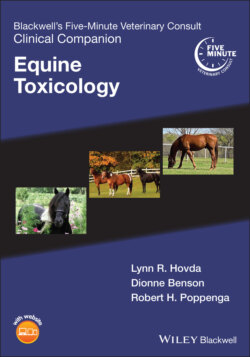Читать книгу Blackwell's Five-Minute Veterinary Consult Clinical Companion - Группа авторов - Страница 28
Seeking a Laboratory
ОглавлениеDefine your testing objective first and foremost. Different laboratories offer different types of tests. A test is a tool. Always use the right tool for the job.
Toxicology laboratories can be subdivided into different functionalities:Environmental, occupational, experimental, and pharmaceutical toxicology laboratories engage in very specific subsections of toxicology.Veterinary diagnostic laboratories and equine drug testing or doping control laboratories offer many of the tests that can be useful to the practitioner looking to determine a cause of illness or death. If there are legal implications (lawsuits, penalties, etc.), the laboratory should be experienced in forensic sample handling and chain of custody procedures. Contacting the laboratory as soon as possible should allow them to provide information to ensure that proper procedures are performed from collection to shipping as well as for testing. The designated laboratory should be accredited for the testing technology requested and utilized.
Veterinary diagnostic laboratories (VDLs). The focus of a VDL is on the diagnosis and prevention of disease in animals. Individual specialized test offerings may vary from laboratory to laboratory. The VDL should be the first stop when the causative agent is unknown, and a consultation with the chief toxicologist should be conducted prior to collecting/submitting samples, whenever possible.
Equine drug testing/doping control laboratory. These laboratories are specialized in testing methods designed for the detection of prohibited compounds in performance animals. Due to the large number of drug compounds these laboratories routinely test for, and the availability of advanced analytical instrumentation, many laboratories can offer a very broad scope of drug coverage with superior sensitivity. However, the scope of coverage is not always uniform among different laboratories beyond a base panel of commonly regulated medications, and most do not offer testing for pesticides, rodenticides, industrial chemicals, etc. Test results obtained from previous testing at a VDL and clinical history should be shared, when possible, to ensure the best possible test selection and avoid analyte overlap.
Private analytical laboratories. These laboratories perform a variety of testing on food, water, dietary supplements, industrial chemicals, pharmaceuticals, etc. Larger facilities can offer state‐of‐the‐art equipment and scientific staff and may be able to test for exotic analytes.
